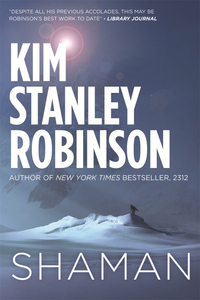Take a photo of a barcode or cover
Unfortunately I can't find it in me to care...would have loved if this incorporated more interesting worldbuilding or even actual history rather than vague speculation on ancient humans. It's a concept I would enjoy if handled differently
Unfortunate title, great story. Best KSR of the 4 I have read. This is like KSR's "Unplugged" album. Stripped of Sci-Fi or Climate-Fi we are able to see him writing without much genre-trappings. He gets to just make characters and run with it.
In some ways this is like an erasure poem: he chooses what to strip away from our time, and has to make a series of decisions about what is essential in homo sapiens and their societies.
The stone age had no universities but Robinsons world-building conceives the idea of an academy as inherent of humanity. So he gives his LasCaux-era tribe an arts and letters proto-professor-mystic, the grumpy old man Thorn. Thorn's colleague is...a proto STEM researcher: the witchy old woman Heather. Heather is really STEM-y: she likes to "publish"! Heather is ever keen for each summer's Eight Eight festival, where she can give a talk. Heather explicitly tries in one scene to teach the empirical method to the main character, the kid Loon. Loon, though compliant, realizes he "doesn't really get it" as she insists that he only change one variable at a time.
Robinson's books often engage in experimental writing. In Ministry for the Future he had entire chapters speaking in first person as The Sun, or An Oil Deposit. In Shaman he does this for a single chapter, speaking first person PoV as the Neanderthal character, Click. The neandarthal conceives of the homo sapiens as "Fast People", but attaches no opinion to this. When we are in the mind of Click, he sees but does not judge. Everything just "is".
Robinson has ever de-emphasized the zap-pow of sci fi and his sociology are active here. He imagines the LasCaux-esque tribes as apparently male run but under the hood strongly matriarchical, so a sort of Bonobos in Chimpanzees clothing. Until later in the book when they encounter a radically patriarchical society. (Take a guess which of these two cultures keeps dogs and which keeps cats.)
It's a bildungsroman: we see the main character through his early teen years so naturally there are plenty of mentions of "kolby" and "spizzle" (including drawing them in charcoal on the cliff wall) as his horniness takes him from humping mother earth (literaly) to a well described .
Lifespans are mentioned. The grumpy old Thorn is in his late thirties. Heather is a peer and seems to be slightly older. She makes what to our ears is sort of a light joke, gravely warning the young protagonist that he better tend to his fractured bone, or else his next 20 years will be all misery.
Both Thorn and Heather lament that there is no mode of transmitting their knowledge reliably; they long for, without knowing it, the invention of writing.
The dialogue is good: brief bursts, with KSR eccentric punctuation: hyphen, not quote marks, and several speakers can be shown without a line break. I like it. I wish all authors punctuated dialogue like this.
Immersing in Shaman felt like a deep cleanse away from plastics, shopping, and the internet.
Interview with Stan:
https://www.davisenterprise.com/news/novelist-kim-stanley-robinson-s-latest-book-is-an-ice-age-tale/article_073f31ef-4609-5e47-9786-34cb2c553a90.html
I thought about and talked about this book in the weeks I spent with it.
In some ways this is like an erasure poem: he chooses what to strip away from our time, and has to make a series of decisions about what is essential in homo sapiens and their societies.
The stone age had no universities but Robinsons world-building conceives the idea of an academy as inherent of humanity. So he gives his LasCaux-era tribe an arts and letters proto-professor-mystic, the grumpy old man Thorn. Thorn's colleague is...a proto STEM researcher: the witchy old woman Heather. Heather is really STEM-y: she likes to "publish"! Heather is ever keen for each summer's Eight Eight festival, where she can give a talk. Heather explicitly tries in one scene to teach the empirical method to the main character, the kid Loon. Loon, though compliant, realizes he "doesn't really get it" as she insists that he only change one variable at a time.
Robinson's books often engage in experimental writing. In Ministry for the Future he had entire chapters speaking in first person as The Sun, or An Oil Deposit. In Shaman he does this for a single chapter, speaking first person PoV as the Neanderthal character, Click. The neandarthal conceives of the homo sapiens as "Fast People", but attaches no opinion to this. When we are in the mind of Click, he sees but does not judge. Everything just "is".
Robinson has ever de-emphasized the zap-pow of sci fi and his sociology are active here. He imagines the LasCaux-esque tribes as apparently male run but under the hood strongly matriarchical, so a sort of Bonobos in Chimpanzees clothing. Until later in the book when they encounter a radically patriarchical society. (Take a guess which of these two cultures keeps dogs and which keeps cats.)
It's a bildungsroman: we see the main character through his early teen years so naturally there are plenty of mentions of "kolby" and "spizzle" (including drawing them in charcoal on the cliff wall) as his horniness takes him from humping mother earth (literaly) to a well described .
Lifespans are mentioned. The grumpy old Thorn is in his late thirties. Heather is a peer and seems to be slightly older. She makes what to our ears is sort of a light joke, gravely warning the young protagonist that he better tend to his fractured bone, or else his next 20 years will be all misery.
Both Thorn and Heather lament that there is no mode of transmitting their knowledge reliably; they long for, without knowing it, the invention of writing.
The dialogue is good: brief bursts, with KSR eccentric punctuation: hyphen, not quote marks, and several speakers can be shown without a line break. I like it. I wish all authors punctuated dialogue like this.
Immersing in Shaman felt like a deep cleanse away from plastics, shopping, and the internet.
Interview with Stan:
https://www.davisenterprise.com/news/novelist-kim-stanley-robinson-s-latest-book-is-an-ice-age-tale/article_073f31ef-4609-5e47-9786-34cb2c553a90.html
I thought about and talked about this book in the weeks I spent with it.
a deceptively slight coming of age story of a long ago indigenous boy on a unnamed planet. deep emotion builds over time in this story, as the resonance of loon’s life starts to reverberate and the people loon lives with and loves come more and more into focus. as he does, as he grows up and becomes more himself in the context of his pack.
i loved this book for how being moved snuck up on me. i found myself tearing up and deeply sorry to let these characters go. and, this story has one of the most impactful and personally meaningful death scenes i’ve read. loon’s mentor thorn, leaving his life and murmuring as he goes “i will be sorry not to see what comes next”.
i loved this book for how being moved snuck up on me. i found myself tearing up and deeply sorry to let these characters go. and, this story has one of the most impactful and personally meaningful death scenes i’ve read. loon’s mentor thorn, leaving his life and murmuring as he goes “i will be sorry not to see what comes next”.
emotional
mysterious
tense
medium-paced
Plot or Character Driven:
Character
Strong character development:
Yes
Loveable characters:
Complicated
Diverse cast of characters:
Complicated
Flaws of characters a main focus:
Complicated
adventurous
emotional
reflective
medium-paced
Plot or Character Driven:
Character
Strong character development:
Yes
Loveable characters:
Yes
Diverse cast of characters:
Complicated
Flaws of characters a main focus:
Yes
Not bad, not great. Felt the author did a great job with the setting - but at the expense of good plot and character development.
I've been quitting books left and right lately; I just have so many I want to read and if they aren't worth my time, I'm not interested. This was one of those. It started off rather promising with a young shaman's wander, but is incredibly slow with too much description of nature and hunting techniques for my taste. I got half way through and there wasn't yet any problem or complication that made me want to keep reading, so I stopped.
Having made his mark in science fiction Robinson is now writing historical fiction. I have read Galileo's Dream before, which i really enjoyed, so was looking forward to this one.
This story is set in Palaeolithic times, when the glaciers set the northern boundary and is centred around a character called Loon, a 12 year old, learning to be a Shaman, and his small tribe of twenty of so people. At the very beginning he is set off on his 'wander' where he is released naked and has to rely on his training an intuition to survive for a number of days; part of the training of becoming a Shaman. He survives, and his training progresses.
At a meeting of tribes he meets with girl, who returns with him to his tribe where they marry. At the next gathering she is snatched back by her tribe and Loon follows. He is captured and is taken back to be used sa a slave. His mentor Thorn decides to try a rescue of Loon and Hega from the tribe.
Overall the story isn't too bad. It has reasonably well formed characters and moderate plot development. Robinson manages to convey really well just how tough it was for humans then, and just how close to starvation that they were on a regular basis. Where the book failed for me was the dialogue. Whilst humans have been capable of complex communication for thousands of years it seems like the dialogue was from the middle ages at times. Closer to 2.5 stars; and didn't take long to read.
This story is set in Palaeolithic times, when the glaciers set the northern boundary and is centred around a character called Loon, a 12 year old, learning to be a Shaman, and his small tribe of twenty of so people. At the very beginning he is set off on his 'wander' where he is released naked and has to rely on his training an intuition to survive for a number of days; part of the training of becoming a Shaman. He survives, and his training progresses.
At a meeting of tribes he meets with girl, who returns with him to his tribe where they marry. At the next gathering she is snatched back by her tribe and Loon follows. He is captured and is taken back to be used sa a slave. His mentor Thorn decides to try a rescue of Loon and Hega from the tribe.
Overall the story isn't too bad. It has reasonably well formed characters and moderate plot development. Robinson manages to convey really well just how tough it was for humans then, and just how close to starvation that they were on a regular basis. Where the book failed for me was the dialogue. Whilst humans have been capable of complex communication for thousands of years it seems like the dialogue was from the middle ages at times. Closer to 2.5 stars; and didn't take long to read.
I loved the ending. I find that a lot of books around this far back in the past are a little lsow - not much happened butthis surprised me . I thoroughly enjoyed this one.
The story is interesting, and has some moments that are gripping. But it's also tedious and over-long. Ultimately it's a coming-of-age story with the whole prehistoric-humans conceit. And while it captures nicely a sense of what that may have been like, I had a hard time feeling swept up in it.
See also:
• http://www.npr.org/2013/08/28/214525930/shaman-takes-readers-back-to-the-dawn-of-humankind
See also:
• http://www.npr.org/2013/08/28/214525930/shaman-takes-readers-back-to-the-dawn-of-humankind






